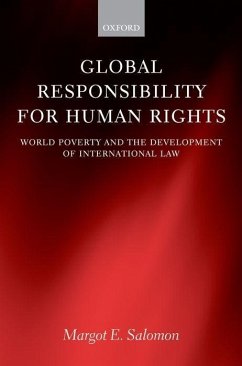Margot E Salomon, Foreword by Stephen P Marks
Global Responsibility for Human Rights
World Poverty and the Development of International Law
Margot E Salomon, Foreword by Stephen P Marks
Global Responsibility for Human Rights
World Poverty and the Development of International Law
- Gebundenes Buch
- Merkliste
- Auf die Merkliste
- Bewerten Bewerten
- Teilen
- Produkt teilen
- Produkterinnerung
- Produkterinnerung
Challenges to the exercise of the basic socio-economic rights of half the global population give rise to some of the most pressing issues today. This timely book focuses on world poverty, providing a systematic exposition of the evolving legal responsibility of the international community of states to cooperate in addressing the structural obstacles that contribute to this injustice. This book analyzes the approach, contribution, and current limitations of the international law of human rights to the manifestations of world poverty, inviting the reader to rethink human rights, and, in…mehr
Andere Kunden interessierten sich auch für
![The United Nations and Human Rights The United Nations and Human Rights]() Philip Alston / Frédéric Mégret (ed.)The United Nations and Human Rights215,99 €
Philip Alston / Frédéric Mégret (ed.)The United Nations and Human Rights215,99 €![Globalization, International Law, and Human Rights Globalization, International Law, and Human Rights]() Jeffery F AddicottGlobalization, International Law, and Human Rights72,99 €
Jeffery F AddicottGlobalization, International Law, and Human Rights72,99 €![Human Rights Standards and the Free Movement of People Within States Human Rights Standards and the Free Movement of People Within States]() Chaloka BeyaniHuman Rights Standards and the Free Movement of People Within States96,99 €
Chaloka BeyaniHuman Rights Standards and the Free Movement of People Within States96,99 €![The European Union, Emerging Global Business and Human Rights The European Union, Emerging Global Business and Human Rights]() Aleydis NissenThe European Union, Emerging Global Business and Human Rights120,99 €
Aleydis NissenThe European Union, Emerging Global Business and Human Rights120,99 €![Positive Obligations Under the European Convention on Human Rights Positive Obligations Under the European Convention on Human Rights]() Vladislava StoyanovaPositive Obligations Under the European Convention on Human Rights174,99 €
Vladislava StoyanovaPositive Obligations Under the European Convention on Human Rights174,99 €![Poverty and Fundamental Rights Poverty and Fundamental Rights]() David BilchitzPoverty and Fundamental Rights186,99 €
David BilchitzPoverty and Fundamental Rights186,99 €![EU Human Rights Policies EU Human Rights Policies]() Andrew WilliamsEU Human Rights Policies81,99 €
Andrew WilliamsEU Human Rights Policies81,99 €-
-
-
Challenges to the exercise of the basic socio-economic rights of half the global population give rise to some of the most pressing issues today. This timely book focuses on world poverty, providing a systematic exposition of the evolving legal responsibility of the international community of states to cooperate in addressing the structural obstacles that contribute to this injustice. This book analyzes the approach, contribution, and current limitations of the international law of human rights to the manifestations of world poverty, inviting the reader to rethink human rights, and, in particular, the framing of responsibilities that are essential to their contemporary protection.
Hinweis: Dieser Artikel kann nur an eine deutsche Lieferadresse ausgeliefert werden.
Hinweis: Dieser Artikel kann nur an eine deutsche Lieferadresse ausgeliefert werden.
Produktdetails
- Produktdetails
- Verlag: Hurst & Co.
- Seitenzahl: 288
- Erscheinungstermin: 10. Januar 2008
- Englisch
- Abmessung: 234mm x 163mm x 23mm
- Gewicht: 567g
- ISBN-13: 9780199284429
- ISBN-10: 0199284423
- Artikelnr.: 22846274
- Herstellerkennzeichnung
- Produktsicherheitsverantwortliche/r
- Europaallee 1
- 36244 Bad Hersfeld
- gpsr@libri.de
- Verlag: Hurst & Co.
- Seitenzahl: 288
- Erscheinungstermin: 10. Januar 2008
- Englisch
- Abmessung: 234mm x 163mm x 23mm
- Gewicht: 567g
- ISBN-13: 9780199284429
- ISBN-10: 0199284423
- Artikelnr.: 22846274
- Herstellerkennzeichnung
- Produktsicherheitsverantwortliche/r
- Europaallee 1
- 36244 Bad Hersfeld
- gpsr@libri.de
Margot E. Salomon, PhD, is a Senior Lecturer in Law at the Centre for the Study of Human Rights and Department of Law, London School of Economics and Political Science. She is a member of the Centres Advisory Board, serves as Advisor to the United Nations High-Level Task Force on the Right to Development and has held a Visiting Lectureship at the UN University in Tokyo. Dr Salomon and has been a consultant to government on human rights and foreign policy and regularly trains diplomatic staff on human rights. She received her PhD from the LSE.
* Foreword by Stephen P. Marks
* INTRODUCTION
* 1: INTERDEPENDENCE AND ITS IMPERATIVES
* 1.1 Introduction
* 1.2 Towards an International Community of States
* 1.2.1 Locating the international community
* 1.2.2 International law of cooperation as the law of the
international community
* 1.2.3 Reconciling sovereignty and interdependence
* 1.2.4 The influence of interdependence on international law
* 1.2.5 The continued predominance of cooperative internationalism in
the 21st century
* 1.3 Globalization in an Era of Human Rights
* 1.3.1 Economic globalization as a structural impediment to the
exercise of human rights
* 1.3.2 Poverty as a human rights issue
* 1.4 The Structural Approach to the Realization of Human Rights
* 1.4.1 The right to development
* 1.4.2 The position of treaty-bodies
* 1.5 Conclusion
*
* 2: SOURCES AND CONTENT OF AN INTERNATIONAL RESPONSIBILITY TO
COOPERATE FOR HUMAN RIGHTS
* 2.1 Introduction
* 2.2 The Sources of Cooperation for Human Rights in International Law
* 2.3 Cooperation and Shared Responsibility in International Human
Rights Instruments
* 2.3.1 International cooperation in human rights conventions and
declarations
* 2.3.1.1 The International Covenant on Economic, Social and Cultural
Rights, the Convention on the Rights of the Child and other human
rights conventions
* 2.3.1.2 Declarations
* 2.3.1.3 The legal basis of international cooperation in the right to
development
* 2.3.1.4 The normative force of the Declaration on the Right to
Development
* 2.3.1.5 International cooperation and shared responsibility at world
conferences
* 2.4 The Content of International Cooperation
* 2.4.1 The position of Northern states
* 2.4.2 'Maximum available resources'
* 2.4.3 The structural content of international cooperation
* 2.5 Conclusion
*
* 3: THE RIGHT TO DEVELOPMENT AND HUMAN-CENTERED GLOBALIZATION
* 3.1 Introduction
* 3.2 The 'Right-Holder' of the Right to Development
* 3.3 The Right to Development as a Particular Process of Development
* 3.3.1 The indivisibility and interdependence of all human rights and
the conditioning of economic policy
* 3.3.2 Rights-based economic growth
* 3.3.3 Obligations of conduct at the international level
* 3.3.4 Principles of the right to development
* 3.3.4.1 Equality and non-discrimination
* 3.3.4.2 Participation
* 3.3.4.3 Accountability
* 3.4 The Current Incongruence of International Legal Regimes
* 3.5 Conclusion
*
* 4: A DOCTRINE OF BASIC UNIVERSAL RIGHTS AND SUPRA-POSITIVE
OBLIGATIONS
* 4.1 Introduction
* 4.2 Beyond Legal Positivism
* 4.3 The Universal Principle to Respect and Observe Human Rights
* 4.4 What Constitutes Basic Rights Today?
* 4.5 Basic Rights and Community Obligations
* 4.6 Conclusion
*
* 5: ATTRIBUTING GLOBAL LEGAL RESPONSIBILITY
* 5.1 Introduction
* 5.2 The Due Diligence Requirement and the Global Standard of Care
* 5.3 A Typology for World Poverty: International Obligations to Remedy
and to Prevent Human Rights Violations
* 5.4. Conclusion
* 6: CONCLUDING REMARKS: LATTER-DAY TYRANNY AND THE FUTURE OF HUMAN
RIGHTS
* INTRODUCTION
* 1: INTERDEPENDENCE AND ITS IMPERATIVES
* 1.1 Introduction
* 1.2 Towards an International Community of States
* 1.2.1 Locating the international community
* 1.2.2 International law of cooperation as the law of the
international community
* 1.2.3 Reconciling sovereignty and interdependence
* 1.2.4 The influence of interdependence on international law
* 1.2.5 The continued predominance of cooperative internationalism in
the 21st century
* 1.3 Globalization in an Era of Human Rights
* 1.3.1 Economic globalization as a structural impediment to the
exercise of human rights
* 1.3.2 Poverty as a human rights issue
* 1.4 The Structural Approach to the Realization of Human Rights
* 1.4.1 The right to development
* 1.4.2 The position of treaty-bodies
* 1.5 Conclusion
*
* 2: SOURCES AND CONTENT OF AN INTERNATIONAL RESPONSIBILITY TO
COOPERATE FOR HUMAN RIGHTS
* 2.1 Introduction
* 2.2 The Sources of Cooperation for Human Rights in International Law
* 2.3 Cooperation and Shared Responsibility in International Human
Rights Instruments
* 2.3.1 International cooperation in human rights conventions and
declarations
* 2.3.1.1 The International Covenant on Economic, Social and Cultural
Rights, the Convention on the Rights of the Child and other human
rights conventions
* 2.3.1.2 Declarations
* 2.3.1.3 The legal basis of international cooperation in the right to
development
* 2.3.1.4 The normative force of the Declaration on the Right to
Development
* 2.3.1.5 International cooperation and shared responsibility at world
conferences
* 2.4 The Content of International Cooperation
* 2.4.1 The position of Northern states
* 2.4.2 'Maximum available resources'
* 2.4.3 The structural content of international cooperation
* 2.5 Conclusion
*
* 3: THE RIGHT TO DEVELOPMENT AND HUMAN-CENTERED GLOBALIZATION
* 3.1 Introduction
* 3.2 The 'Right-Holder' of the Right to Development
* 3.3 The Right to Development as a Particular Process of Development
* 3.3.1 The indivisibility and interdependence of all human rights and
the conditioning of economic policy
* 3.3.2 Rights-based economic growth
* 3.3.3 Obligations of conduct at the international level
* 3.3.4 Principles of the right to development
* 3.3.4.1 Equality and non-discrimination
* 3.3.4.2 Participation
* 3.3.4.3 Accountability
* 3.4 The Current Incongruence of International Legal Regimes
* 3.5 Conclusion
*
* 4: A DOCTRINE OF BASIC UNIVERSAL RIGHTS AND SUPRA-POSITIVE
OBLIGATIONS
* 4.1 Introduction
* 4.2 Beyond Legal Positivism
* 4.3 The Universal Principle to Respect and Observe Human Rights
* 4.4 What Constitutes Basic Rights Today?
* 4.5 Basic Rights and Community Obligations
* 4.6 Conclusion
*
* 5: ATTRIBUTING GLOBAL LEGAL RESPONSIBILITY
* 5.1 Introduction
* 5.2 The Due Diligence Requirement and the Global Standard of Care
* 5.3 A Typology for World Poverty: International Obligations to Remedy
and to Prevent Human Rights Violations
* 5.4. Conclusion
* 6: CONCLUDING REMARKS: LATTER-DAY TYRANNY AND THE FUTURE OF HUMAN
RIGHTS
* Foreword by Stephen P. Marks
* INTRODUCTION
* 1: INTERDEPENDENCE AND ITS IMPERATIVES
* 1.1 Introduction
* 1.2 Towards an International Community of States
* 1.2.1 Locating the international community
* 1.2.2 International law of cooperation as the law of the
international community
* 1.2.3 Reconciling sovereignty and interdependence
* 1.2.4 The influence of interdependence on international law
* 1.2.5 The continued predominance of cooperative internationalism in
the 21st century
* 1.3 Globalization in an Era of Human Rights
* 1.3.1 Economic globalization as a structural impediment to the
exercise of human rights
* 1.3.2 Poverty as a human rights issue
* 1.4 The Structural Approach to the Realization of Human Rights
* 1.4.1 The right to development
* 1.4.2 The position of treaty-bodies
* 1.5 Conclusion
*
* 2: SOURCES AND CONTENT OF AN INTERNATIONAL RESPONSIBILITY TO
COOPERATE FOR HUMAN RIGHTS
* 2.1 Introduction
* 2.2 The Sources of Cooperation for Human Rights in International Law
* 2.3 Cooperation and Shared Responsibility in International Human
Rights Instruments
* 2.3.1 International cooperation in human rights conventions and
declarations
* 2.3.1.1 The International Covenant on Economic, Social and Cultural
Rights, the Convention on the Rights of the Child and other human
rights conventions
* 2.3.1.2 Declarations
* 2.3.1.3 The legal basis of international cooperation in the right to
development
* 2.3.1.4 The normative force of the Declaration on the Right to
Development
* 2.3.1.5 International cooperation and shared responsibility at world
conferences
* 2.4 The Content of International Cooperation
* 2.4.1 The position of Northern states
* 2.4.2 'Maximum available resources'
* 2.4.3 The structural content of international cooperation
* 2.5 Conclusion
*
* 3: THE RIGHT TO DEVELOPMENT AND HUMAN-CENTERED GLOBALIZATION
* 3.1 Introduction
* 3.2 The 'Right-Holder' of the Right to Development
* 3.3 The Right to Development as a Particular Process of Development
* 3.3.1 The indivisibility and interdependence of all human rights and
the conditioning of economic policy
* 3.3.2 Rights-based economic growth
* 3.3.3 Obligations of conduct at the international level
* 3.3.4 Principles of the right to development
* 3.3.4.1 Equality and non-discrimination
* 3.3.4.2 Participation
* 3.3.4.3 Accountability
* 3.4 The Current Incongruence of International Legal Regimes
* 3.5 Conclusion
*
* 4: A DOCTRINE OF BASIC UNIVERSAL RIGHTS AND SUPRA-POSITIVE
OBLIGATIONS
* 4.1 Introduction
* 4.2 Beyond Legal Positivism
* 4.3 The Universal Principle to Respect and Observe Human Rights
* 4.4 What Constitutes Basic Rights Today?
* 4.5 Basic Rights and Community Obligations
* 4.6 Conclusion
*
* 5: ATTRIBUTING GLOBAL LEGAL RESPONSIBILITY
* 5.1 Introduction
* 5.2 The Due Diligence Requirement and the Global Standard of Care
* 5.3 A Typology for World Poverty: International Obligations to Remedy
and to Prevent Human Rights Violations
* 5.4. Conclusion
* 6: CONCLUDING REMARKS: LATTER-DAY TYRANNY AND THE FUTURE OF HUMAN
RIGHTS
* INTRODUCTION
* 1: INTERDEPENDENCE AND ITS IMPERATIVES
* 1.1 Introduction
* 1.2 Towards an International Community of States
* 1.2.1 Locating the international community
* 1.2.2 International law of cooperation as the law of the
international community
* 1.2.3 Reconciling sovereignty and interdependence
* 1.2.4 The influence of interdependence on international law
* 1.2.5 The continued predominance of cooperative internationalism in
the 21st century
* 1.3 Globalization in an Era of Human Rights
* 1.3.1 Economic globalization as a structural impediment to the
exercise of human rights
* 1.3.2 Poverty as a human rights issue
* 1.4 The Structural Approach to the Realization of Human Rights
* 1.4.1 The right to development
* 1.4.2 The position of treaty-bodies
* 1.5 Conclusion
*
* 2: SOURCES AND CONTENT OF AN INTERNATIONAL RESPONSIBILITY TO
COOPERATE FOR HUMAN RIGHTS
* 2.1 Introduction
* 2.2 The Sources of Cooperation for Human Rights in International Law
* 2.3 Cooperation and Shared Responsibility in International Human
Rights Instruments
* 2.3.1 International cooperation in human rights conventions and
declarations
* 2.3.1.1 The International Covenant on Economic, Social and Cultural
Rights, the Convention on the Rights of the Child and other human
rights conventions
* 2.3.1.2 Declarations
* 2.3.1.3 The legal basis of international cooperation in the right to
development
* 2.3.1.4 The normative force of the Declaration on the Right to
Development
* 2.3.1.5 International cooperation and shared responsibility at world
conferences
* 2.4 The Content of International Cooperation
* 2.4.1 The position of Northern states
* 2.4.2 'Maximum available resources'
* 2.4.3 The structural content of international cooperation
* 2.5 Conclusion
*
* 3: THE RIGHT TO DEVELOPMENT AND HUMAN-CENTERED GLOBALIZATION
* 3.1 Introduction
* 3.2 The 'Right-Holder' of the Right to Development
* 3.3 The Right to Development as a Particular Process of Development
* 3.3.1 The indivisibility and interdependence of all human rights and
the conditioning of economic policy
* 3.3.2 Rights-based economic growth
* 3.3.3 Obligations of conduct at the international level
* 3.3.4 Principles of the right to development
* 3.3.4.1 Equality and non-discrimination
* 3.3.4.2 Participation
* 3.3.4.3 Accountability
* 3.4 The Current Incongruence of International Legal Regimes
* 3.5 Conclusion
*
* 4: A DOCTRINE OF BASIC UNIVERSAL RIGHTS AND SUPRA-POSITIVE
OBLIGATIONS
* 4.1 Introduction
* 4.2 Beyond Legal Positivism
* 4.3 The Universal Principle to Respect and Observe Human Rights
* 4.4 What Constitutes Basic Rights Today?
* 4.5 Basic Rights and Community Obligations
* 4.6 Conclusion
*
* 5: ATTRIBUTING GLOBAL LEGAL RESPONSIBILITY
* 5.1 Introduction
* 5.2 The Due Diligence Requirement and the Global Standard of Care
* 5.3 A Typology for World Poverty: International Obligations to Remedy
and to Prevent Human Rights Violations
* 5.4. Conclusion
* 6: CONCLUDING REMARKS: LATTER-DAY TYRANNY AND THE FUTURE OF HUMAN
RIGHTS








